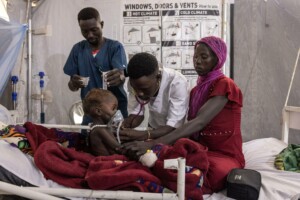‘Influx from South Sudan into East Darfur and West Kordofan continues’: UN OCHA
According to aid organisations on the ground, more than 48,000 South Sudanese have arrived in East Darfur, South Darfur and West Kordofan states since late January 2016. These people are reportedly leaving South Sudan due to food insecurity, as a result of armed conflict, the failure of the agricultural season, the unavailability of food and high prices of cereals in South Sudan.
According to aid organisations on the ground, more than 48,000 South Sudanese have arrived in East Darfur, South Darfur and West Kordofan states since late January 2016. These people are reportedly leaving South Sudan due to food insecurity, as a result of armed conflict, the failure of the agricultural season, the unavailability of food and high prices of cereals in South Sudan.
The UN Office for the Coordination of Humanitarian Affairs (OCHA) in Sudan reports in its latest bulletin that the new arrivals are fleeing from South Sudan’s Northern Bahr El Gazal, Eastern Bahr El Gazal and Warrap states.
South Sudanese arrivals in East Darfur reach 40,500
In East Darfur, 40,468 South Sudanese have arrived in seven locations in the state over the past two months, according to the registration committee in Khor Omer camp, the Sudanese Red Crescent Society (SRCS) and Government’s Humanitarian Aid Commission (HAC). A team from the International Organization for Migration (IOM) is currently in Ed Daein town for the verification of the new arrivals in Khor Omer and is training enumerators, including staff from HAC, the SRCS and others. The number of South Sudanese in other localities in the state will be ascertained during a mission planned next week.
The majority of South Sudanese arrivals in East Darfur are in Khor Omer camp in Ed Daein town, the capital of East Darfur State. These people are arriving at an average rate of 500 per day, bringing the total number of new arrivals to 25,041 as of 27 March. IOM is expected to start verifying the new arrivals in Khor Omer camp on 29 March. In the meantime, aid organisations continue to respond to the needs of the South Sudanese. So far, the World Food Programme (WFP) has provided food assistance to about 16,200 new arrivals and food distribution is ongoing for a further 6,420 people who arrived between 9 – 21 March.
New arrivals access health services at the primary healthcare centre in the camp where consultations have reached an average of 75 per day. The State Ministry of Health (SMoH) has deployed a medical assistant and two health educators to the clinic and with the support of the World Health Organization (WHO) it sends medicine to the clinic on a weekly basis. South Sudanese receive free health medical services as per an agreement between the SMoH and WHO. With the support of WHO, the SMoH has also started weekly vector control activities in the camp.
Access to water remains a challenge in Khor Omer despite the recent major improvement in water and sanitation services in the camp. Unamid has been trucking-in 6,000 litres of water per day since 17 March and plans to continue this for a month. In addition, the national NGO ASSIST will start trucking in 11,000 litres per day.
Despite all efforts to increase the water supply, there is still a deficit of about 235,000 litres of water per day, according to the Government’s Water and Environmental Sanitation Department (WES).
This deficit is likely to increase as more people arrive in the camp. WES has increased the pumping hours of the water station by two hours, which is the maximum operational capacity. The SMoH has built 15 community latrines and finished a cleaning campaign on 25 March. An additional 790 latrines are still needed.
So far, no shelter materials have been distributed to the newly arrived South Sudanese in Khor Omer. The international NGO United Methodist Committee on Relief (UMCOR) is currently making arrangements to distribute shelter supplies to 1,000 families. Emergency household supplies have so far been distributed to 700 out of 6,000 families.
About 3,500 South Sudanese arrivals in South Darfur
By 26 March, the office of Sudan’s Commissioner for Refugees (COR) had registered an estimated 3,485 new South Sudanese arrivals in Bielel IDP camp in South Darfur. According to COR, the new arrivals are in need of food, emergency shelter and household supplies, as well as water, health and education assistance. So far, no humanitarian assistance has been provided to the new arrivals and they are sheltering with South Sudanese who had been living in the area prior to the recent influx. There are concerns that the host community is overwhelmed by this new influx. An inter-agency assessment mission will visit the camp on 29 March.
South Sudanese continue to arrive in West Kordofan
Through an inter-agency mission to El Meriam locality in West Kordofan State during 15 – 18 March, WFP verified 1,559 new arrivals in El Meriam since February, with about 15 – 20 people arriving daily. The number of new South Sudanese arrivals in El Meriam is probably higher as there are reports of new arrivals taking refuge in nearby areas who could not be reached by the inter-agency team. In Kharasana, HAC reported about 2,500 new arrivals in the area last week. WFP is currently verifying and distributing food assistance to these new arrivals.
Bordure closure
The South Sudanese government has regretted a decision of the Sudanese government to close its recently reopened border between the two countries, accusing Juba of resuming its support to rebel groups.
In an interview with Sudan Tribune, General Chol Thon, Governor of Eastern Nile state, one of the newly created 28 states, told Sudan Tribune on Wednesday that it was unfortunate the Sudanese government decided to shut down border after an unilateral decision by Sudanese president Omer al-Bashir earlier this year.
"It is unfortunate that after the Sudanese government has decided to stop border crossing after we have set out how as a state government will support these bold steps by both our President General Salva Kiir Mayardit and his brother, Omer al Bashir, President of the Republic of Sudan, to open a new page in bilateral cooperation in pursuit of mutual benefits and interest of our sisterly countries," Governor Chol said.

(Sources: UN OCHA / Sudan Tribune)











 and then
and then